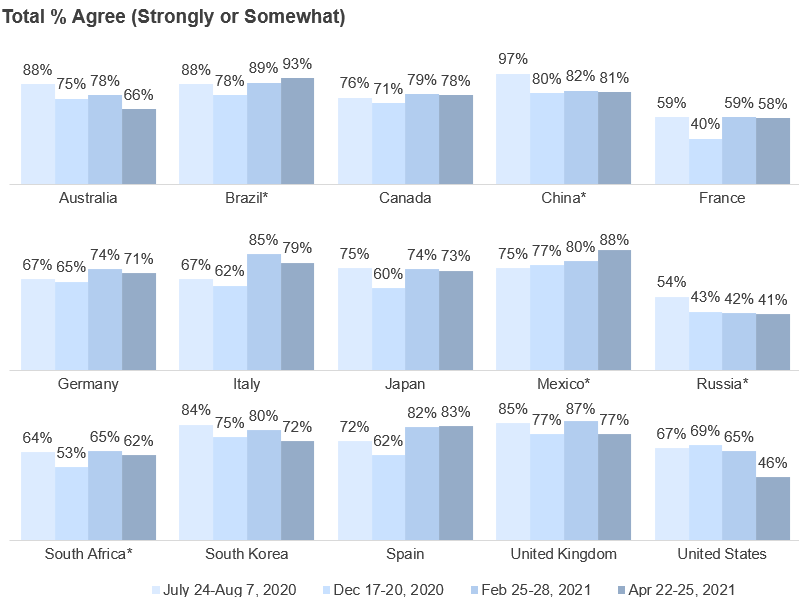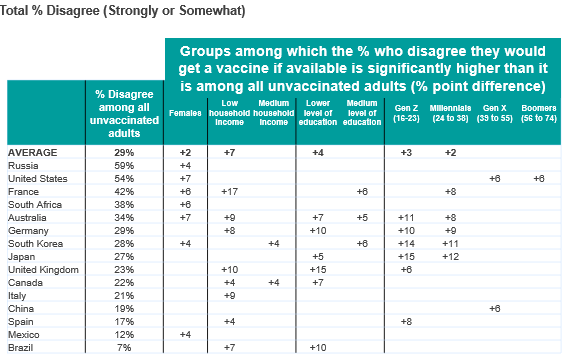Majorities of unvaccinated adults in most of 15 countries would get a vaccine if they could
A new Ipsos survey of nearly 10,000 unvaccinated adults in 15 countries conducted in partnership with the World Economic Forum finds that vaccine hesitancy tends to be more prevalent among those with lower incomes or lower levels of education, younger generations and/or females. Majorities in all but two of the countries surveyed intend to get a COVID-19 vaccine when it will be available to them. However, the study indicates that vaccination intent has been declining since February – not only in the United States and the United Kingdom where about half of all adults have already received at least one dose, but also in countries, where fewer vaccination campaigns have been much slower, such as Australia and South Korea.
The survey was conducted among 9,890 unvaccinated adults under the age of 75, April 22-25, 2021, on Ipsos’ Global Advisor online platform.
Read the World Economic Forum's article
Vaccination intent among the unvaccinated by country
Among adults who have not yet been vaccinated against COVID-19, those who strongly or somewhat agree they would get it make up a majority of those who report they have not yet received it in 13 of the 15 countries surveyed. Intent to get vaccinated among those who are not is:
- Very high in Brazil (93%), Mexico (88%), Spain (83%), and China (81%);
- Fairly high in Italy (79%), Canada (78%), Japan (73%), South Korea (72%), and Germany (71%);
- Middling in Australia (66%), South Africa (62%), and France (58%); and,
- Low in United States (46%) and Russia (41%)
While the percentage of unvaccinated adults who strongly or somewhat agree they would get a COVID-19 vaccine has not changed significantly since February in eight of the 15 countries, it has increased by more than 3 points in Mexico (+8) and Brazil (+4) and it has dropped by more than 3 points in the United States (-19), Australia (-12), the United Kingdom (-10), South Korea (-8), and Italy (-6).
To put these numbers in perspective, according to Oxford University data, the share of the population who had been given at least one dose of the vaccine at the time of the survey was: approximately 50% in the U.K; 41% in the U.S, 29% in Canada, 23% in Germany, 22% in Spain, 21% in France and Italy, 13% in Brazil, 9% in Mexico, 8% in Russia, 4% in South Korea, 1% in Japan and Australia, and less than 1% in South Africa.

Profiling the vaccine hesitant
On average, among all adults surveyed across the 15 countries, 29% disagree they would get a vaccine for COVID-19 if it were available to them. Ipsos found that a higher percentage among:
- Those with a lower household income (by 7 points);
- Those with a lower level of education (by 4 points);
- Those aged 16-23 a.k.a. Gen Z (by 3 points) and those aged 24 to 38 a.k.a. Millennials (2 points); and
- Females (2 points)
The following demographic groups are significantly more likely to disagree in various countries:
- Those in the lower income group in France (17 points), the U.K. (10 points), Australia and Italy (9 points), Germany (8 points), Brazil (7 points), and Canada and Spain (4 points); and in the medium income group in South Korea and Canada (4 points);
- Those with a lower level of education in the U.K. (15 points), Brazil and Germany (10 points), Australia and Canada (7 points), and Japan (5 points); and with a medium level education in France and South Korea (6 points) and Australia (5 points);
- Gen Z members in Japan (15 points), South Korea (14 points), Australia (11 points), Germany (10 points), Spain (8 points), and the U.K. (6 points); Millennials in Japan (12 points) , South Korea (11 points), Germany (9 points), Australia and France (8 points)
- In contrast, Gen X members (aged 39 to 55) in China and the U.S. (by 6 points in both); and Boomers (aged 55 to 74) only in the U.S. (by 6 points);
- Women in Australia, the U.S. (7 points above average in both countries), France and South Africa (6 points), as well as Mexico, Russia and South Korea (4 points);




